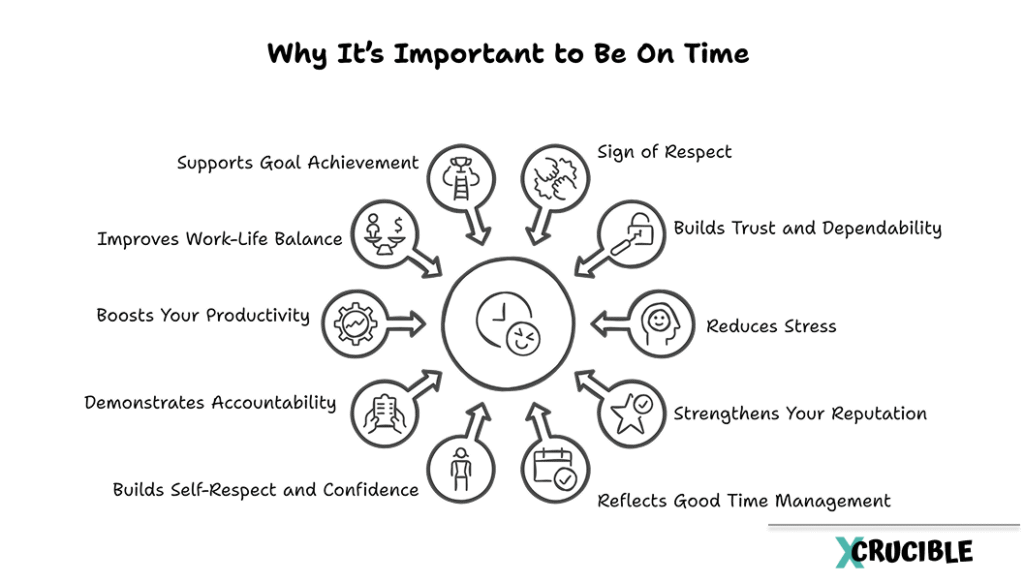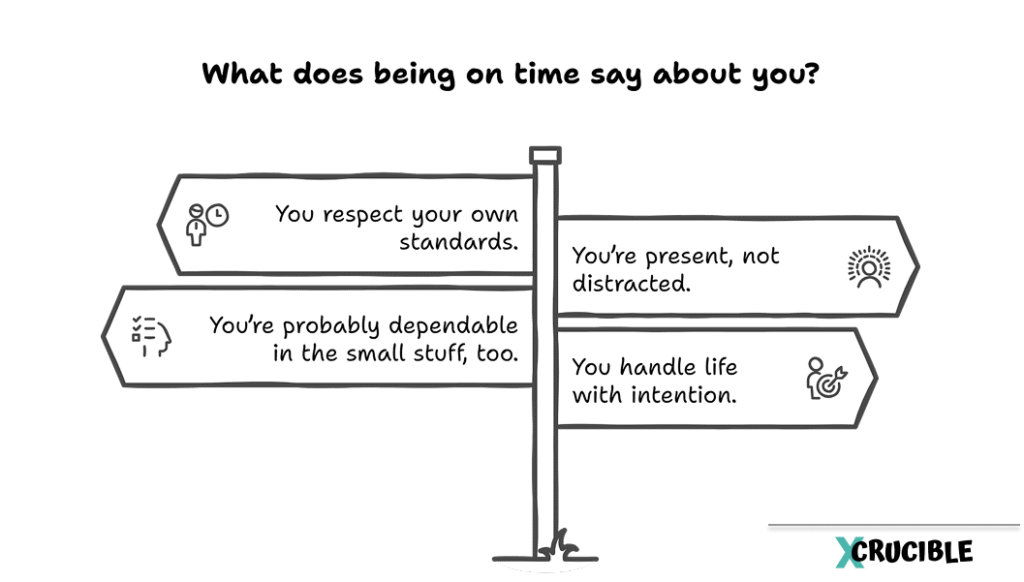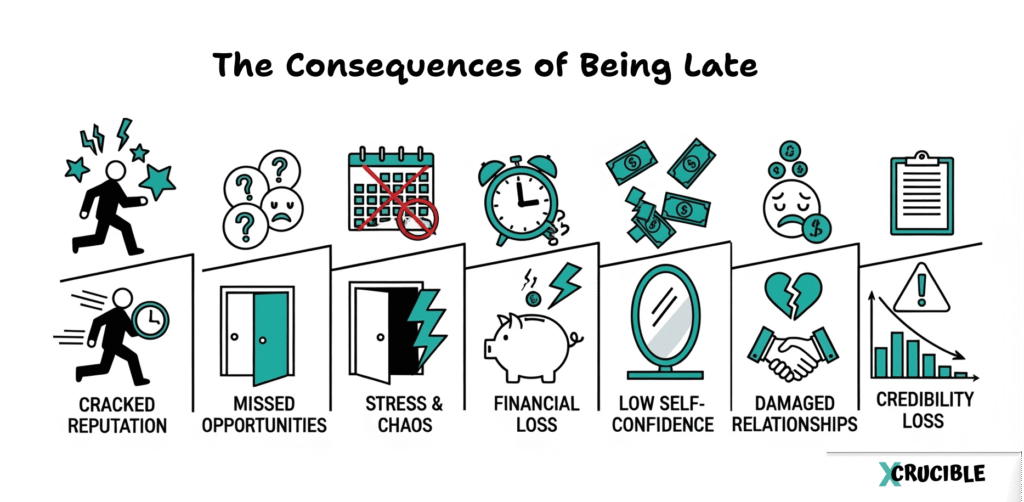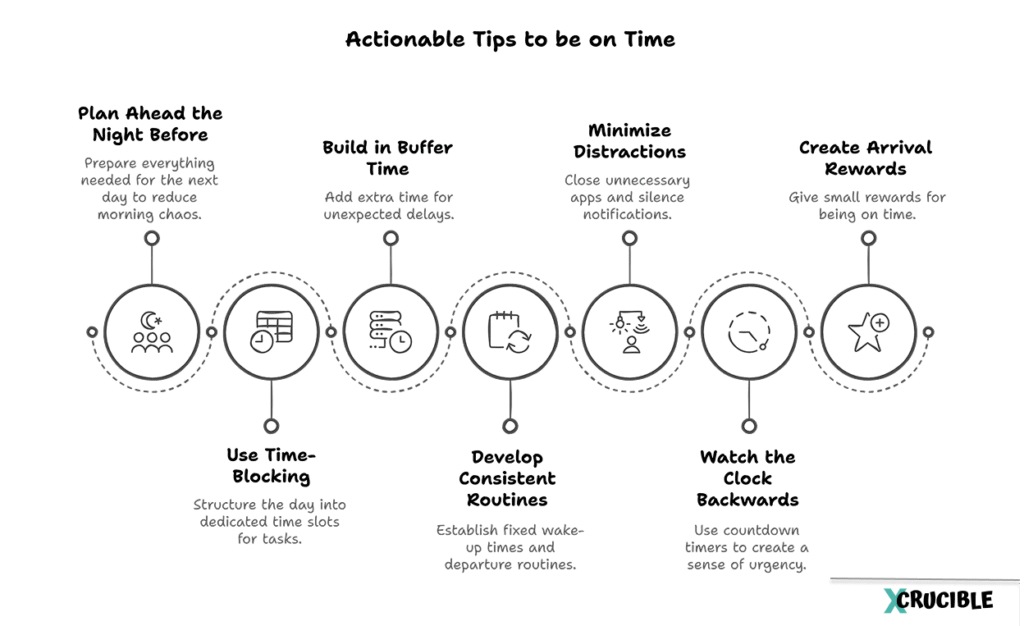Late again? You’re not alone.
But what if I told you that those few extra minutes you lose could actually cost you opportunities, trust, and peace of mind?
Being on time is more powerful than you might think—let’s explore why those moments truly matter.
What “Being on Time” Really Means
Being on time means showing up when you’re expected—neither late nor too early. It’s about respecting both the schedule and the people involved, making sure you don’t cause any delays.
It isn’t just about being physically present at the right moment; it also means being ready and prepared to start whatever is planned.
In short, being on time means showing up when you said you would, fully prepared.
10 Reasons Why It’s Important to Be On Time
Being on time is more than a good habit—it’s a reflection of your mindset, character, and the way you approach commitments. Here’s why it matters so much:

Sign of Respect
Time is one of the few things we can’t get back. So, when someone gives you a time slot, they’re giving you part of their day. When you show up on time, you’re sending a message: “I value your time.” Pretty powerful, right?
Builds Trust and Dependability
People notice patterns. Whether it’s your boss, a client, a teacher, or a friend, being on time shows them you’re reliable — someone they can count on. Over time, this trust opens doors—more responsibility, stronger relationships, and more opportunities.
Reduces Stress (More Than You Think)
Running late creates unnecessary anxiety. You’re rushing, watching the clock, maybe even skipping important stuff just to catch up. But when you’re on time, or even a little early, you avoid that last-minute panic. You give yourself space to breathe, think, and ease into whatever’s next.
Strengthens Your Reputation
People judge fast — sometimes way too fast! And punctuality is one of the simplest ways to make a good impression. Whether it’s a job interview, a client call, or a first date, showing up on time immediately tells the other person that you’re serious, reliable, and respectful.
Reflects Good Time Management
Being on time isn’t about luck — it’s about planning. It means you’ve thought ahead, managed your schedule, and allowed enough time to get where you need to be. That kind of organization and self-discipline is gold in pretty much every part of life.
Builds Self-Respect and Confidence
When you’re on time, you’re keeping promises to yourself. That feels good, right? These small wins add up, building your confidence over time — helping you tackle work challenges or personal goals with a little more swagger.
Demonstrates Accountability and Integrity
Showing up when you say you will means you take your commitments seriously. It’s all about integrity — doing what you say, when you say it. And that kind of attitude earns respect everywhere, from your personal life to the professional world.
Boosts Your Productivity
Starting things on time sets the tone for a smooth, focused day. Running late? That just messes with your flow and wastes time. Punctuality keeps things moving, so you get more done and stay on track.
Improves Work-Life Balance
Good time management, which includes being punctual, helps you avoid overtime and last-minute tasks. By sticking to schedules and deadlines, you free up personal time and reduce stress, which supports a healthier balance between work and life.
Supports Goal Achievement
When you’re consistent about showing up on time, you’re building routines that push you toward your goals. Whether it’s finishing projects, learning something new, or sticking to healthy habits, punctuality keeps you moving forward, step by step.
What Being on Time Says About You
Being on time may seem small, but it says a lot without you having to say anything. Here are a few:

You respect your own standards.
Being on time isn’t just about others—it shows you take your commitments seriously. It’s a sign that you hold yourself to a certain level of discipline, even when no one’s watching.
You’re present, not distracted.
Punctual people tend to be mentally dialed in. You’re not just physically arriving—you’re arriving with focus. It tells people that when you’re here, you’re really here, not still finishing the last thing in your head.
You’re probably dependable in the small stuff, too.
People figure if you’re on time, you’re the kind who follows through on the everyday things—replying to messages, finishing tasks, remembering the little details. It’s not just about the clock—it’s about consistency.
You handle life with intention.
Being on time shows you’re not being pulled around by chaos. You’ve thought ahead, made choices, and prioritized what matters. It hints at a life that’s led on purpose, not just on autopilot.
The Hidden Costs of Being Late
Being late might seem harmless—“just five minutes,” right? But over time, those small delays come with bigger consequences, many of which we don’t immediately notice.
Here’s a look at what lateness is really costing us, beyond the awkward apologies.

- It quietly damages your reputation and makes others question your reliability, even if you’re skilled or well-intentioned.
- Over time, it leads to missed opportunities — from job interviews and meetings to chances for growth or recognition.
- Lateness often triggers stress, making you feel rushed, scattered, and less in control of your day.
- It can cost you financially — think missed flights, penalties, rescheduled appointments, or lost deals.
- Constantly running late slips your self-confidence, making you feel like you’re always behind in life.
- It affects relationships — people may feel disrespected or undervalued when you keep them waiting.
- Lateness signals a lack of preparation or priority, which can impact your personal and professional credibility.
Why People Struggle With Punctuality
Let’s be real—most of us want to be on time. We don’t wake up thinking, “Let me stress myself out by running late today.” But still, it happens. A lot. And the more we try to fix it with calendars and alarms, the more frustrating it gets.
So… what’s really going on?
We underestimate how long things take.
Our brains aren’t great at judging time. Sounds weird, but it’s true. Psychologists call this the planning fallacy—we tend to underestimate how long tasks will take, no matter how many times we’ve done them before. So that quick email or “five-minute” errand? It almost always takes longer than we think.
Our brain loves comfort, not pressure.
If getting ready feels stressful or the task ahead is boring, our brain will find a detour. Suddenly replying to a message or folding laundry becomes more appealing. This is classic procrastination, and it’s not about laziness—it’s our brain dodging discomfort.
We run on “ideal time” instead of real time.
A lot of people plan their day based on how things would go if everything went perfectly. No traffic, no last-minute interruptions, no spilled coffee. But real life doesn’t work that way. And when you leave zero buffer, even a small delay can throw everything off.
The “now bias” tricks us.
This fancy term means we prioritize what feels good right now over what’s important later. So hitting snooze or taking “just five more minutes” seems tempting, even if we know it’ll make us late.
Common Excuses and What They Actually Reveal
- “I lost track of time.”
Often signals poor planning or lack of time awareness, not just distraction. - “Traffic was bad.”
A classic external blame. If it’s recurring, it points to not building in buffer time. - “I had too much going on.”
Points to overcommitting or not setting realistic time blocks for your tasks. - “I’m just not a morning person.”
Often used as a cover for inconsistent routines or resistance to change. - “I work better under pressure.”
Can mask procrastination habits and avoidance of structure. - “It’s not a big deal, everyone’s late sometimes.”
Normalizing lateness shows a casual attitude toward others’ time. - “I didn’t think it would matter.”
Reflects misjudging the importance of the situation or the value of others’ time.
Most excuses sound harmless — but they often reveal deeper habits, priorities, or a lack of time ownership.
How to Always Be on Time: Actionable Tips

Plan Ahead the Night Before
Give yourself a head start by preparing everything you’ll need the next day — from your outfit to work materials or travel plans. This reduces morning chaos and last-minute stress, making it easier to leave on time.
Use Time-Blocking to Structure Your Day
Break your day into dedicated time slots for each task or activity. Time-blocking not only keeps you focused but also makes it easier to see how long things realistically take, preventing over-scheduling.
Build in Buffer Time for Unexpected Delays
Always add extra time—about 10 to 15 minutes—to your estimated commute or preparation time. This cushion gives you breathing room for traffic, last-minute tasks, or other surprises without making you late.
Develop Consistent Routines and Habits
Establish fixed wake-up times, morning rituals, and departure routines. The more predictable your schedule, the easier it is for your brain to get into “on-time mode.”
Minimize Distractions Before Go-Time
Close unnecessary apps, silence notifications, and avoid multitasking right before you need to leave or attend a meeting. This focus helps prevent getting sucked into distractions that eat up time.
Watch the clock backwards (seriously)
Use countdown timers (e.g. “25 minutes left to leave”) instead of standard clocks. Your brain responds more urgently to shrinking time than to a fixed number, making you more likely to act.
Create “arrival rewards”
Give yourself a small reward for being early or on time — coffee from your favorite place, 5 minutes of phone scrolling, or simply crossing off a habit tracker. These micro-rewards build positive reinforcement and make punctuality feel good, not forced.
Remember, punctuality isn’t about perfection — it’s about consistently showing up with respect for your time and others’. Small, intentional changes will build momentum and make being on time your new norm.
Imagine Being Late to Yourself
You wake up with a plan. A promise to yourself to start fresh, to take that first step — maybe it’s writing, exercising, or simply getting ready for the day. You say, “Just five more minutes,” but those minutes quietly slip away.
You reach for your phone. One scroll becomes ten. Distractions pull you deeper, and suddenly, you’re running behind before you even leave your bed. That delay isn’t just time lost; it’s a crack in your confidence, a silent message that you’re not fully committed to yourself.
By the time you finally get moving, the calm energy you had is replaced by stress and frustration. You feel rushed, scattered, and already behind. The day feels harder, heavier — and all because of those stolen minutes.

Showing up on time for yourself means honoring your promise the moment it’s made. It means stepping into your day with intention and presence, ready to face whatever comes.
Because the time you give yourself before you even start sets the tone for everything that follows. Lose it, and you lose more than minutes — you lose your momentum, your belief, your power.
Final Thoughts
Being on time is more than just a habit—it’s a powerful way to show respect, build trust, and take control of your life. It reflects your values, your mindset, and your commitment—not only to others but also to yourself.
Remember, no one is perfect. Being punctual isn’t about never being late; it’s about showing up consistently and making time your ally, not your enemy.
Start small, build momentum, and watch how respecting time opens doors in both your personal and professional life. Because in the end, being on time is really about valuing what matters most.
Make every minute count!